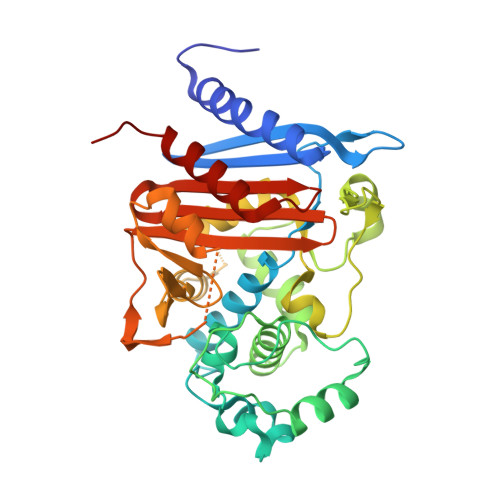Novel inhibition mechanism of carbapenems on the ACC-1 class C beta-lactamase.
Bae, D.W., Jung, Y.E., Jeong, B.G., Cha, S.S.(2020) Arch Biochem Biophys 693: 108570-108570
- PubMed: 32888908
- DOI: https://doi.org/10.1016/j.abb.2020.108570
- Primary Citation of Related Structures:
6M5H, 6M5P, 6M5Q - PubMed Abstract:
The hydrolysis of β-lactam antibiotics by class C β-lactamases proceeds through the acylation and the rate-determining deacylation steps mediated by the nucleophilic serine and the deacylation water, respectively. The pose of poor substrates such as carbapenems in the acylated enzyme is responsible for the low efficient deacylation reaction. Here we present the crystal structures of the Y150F variant of the ACC-1 class C β-lactamase in the apo and acylated states. In the acylated enzyme complexed with two carbapenems, imipenem and meropenem, the lactam carbonyl oxygen is located in the oxyanion hole. However, the five-membered pyrroline ring displays a novel orientation that has not been reported so far. The ring is rotated such that its C3 carboxylate makes salt bridges with Lys67 and Ly315, which is accompanied by the side-chain rotamer change of Phe150. The C3 carboxylate is placed where the deacylation water occupies in the apo-enzyme, which, together with the displacement of the catalytic base residue at position 150, explains why carbapenems are poor substrates of ACC-1.
- Department of Chemistry & Nanoscience, Ewha Womans University, Seoul, 03760, Republic of Korea.
Organizational Affiliation:

















